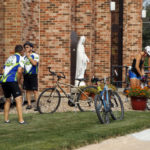While some of us complain about the choices for president of the United States and whether we should vote at all, let’s consider one large group of Iowa citizens who don’t have the right to vote. They are convicted felons, some 55,000 individuals, according to the Iowa Secretary of State’s office. That includes people who are incarcerated. The question for us to consider: after they’ve served their time and paid their debt to society, should convicted felons regain their right to vote?
On June 30 the Iowa Supreme Court upheld the state’s permanent ban on voting for individuals convicted of a felony. Iowa’s law is among the strictest in the nation. The Iowa Constitution (1857) reads: “No … person convicted of any infamous crime, shall be entitled to the privilege of an elector.” The interpretation of “infamous” has been argued for years, but in 1994 Iowa lawmakers passed a bill that encompassed all felonies.
Convicted felons have one slim opportunity. They may apply to the governor’s office for restoration of voting rights upon completion of their sentences, any required probation, parole, or supervised release, and after paying all court costs, fees and restitution. Civil rights activists see this process as onerous, even though Gov. Terry Branstad streamlined the application form. But in 2011, he also rescinded a previous governor’s decision that gave convicted felons voting rights after completion of their sentence. One media outlet reports that fewer than 20 convicted felons per year get their voting rights restored.
The Catholic Church doesn’t specifically address voting rights for convicted felons, but speaks to a merciful approach in a document released in 2000 titled
“Responsibility, Rehabilitation, and Restoration: A Catholic Perspective on Crime and Criminal Justice.” Ponder these words in the document:
“Crime and corrections are at the intersection of rights and responsibilities. Those who commit crimes violate the rights of others and disregard their responsibilities. But the test for the rest of us is whether we will exercise our responsibility to hold the offender accountable without violating his or her basic rights. Even offenders should be treated with respect for their rights.”
Faithful Citizenship for Iowa Catholics, updated for this year’s presidential election, notes that “civic engagement is a moral obligation and we have a duty to vote if we are able.” If our participation in the election process is this important, shouldn’t we reconsider our state’s tough stance on who gets to vote and who does not? Should every felon be automatically excluded?
Tom Chapman, the Iowa Catholic Conference’s executive director, said that in light of the Iowa Supreme Court decision “I anticipate we will continue to support legislation in Iowa to restore voting rights for ex-offenders.”
Why not advocate for the approach taken by former Kentucky Gov. Steve Beshear, who restored voting rights last November for more than 170,000 Kentuckians with nonviolent felony convictions. In an editorial commenting on Beshear’s executive order, America magazine noted that “the restoration of voting rights sends a signal to ex-offenders that they are invited, and expected, to become law-abiding members of their community.” America also noted that Florida and Iowa maintain lifetime bans, with exceptions that “can be granted on what seems to be an arbitrary basis.”
Many thoughtful Catholics have strong feelings about whether convicted felons should have their voting rights restored. For some, it depends on the nature of the crime and harm to victims. For others it’s about the trustworthiness of the perpetrator. Ultimately, shouldn’t we be asking: How is the common good served by automatically denying voting rights to all convicted felons?
The Iowa General Assembly won’t convene until next January, two months after the presidential election. Between now and then, take time to explore this issue in your own mind and with others. Ask your legislators to consider an amendment to the Constitution that would allow convicted felons to have their voting rights restored after completing their sentences.
As the U.S. bishops say in Forming Consciences for Faithful Citizenship, “Even those who cannot vote have the right to have their voices heard on issues that affect their lives and the common good.”
Barb Arland-Fye, Editor











